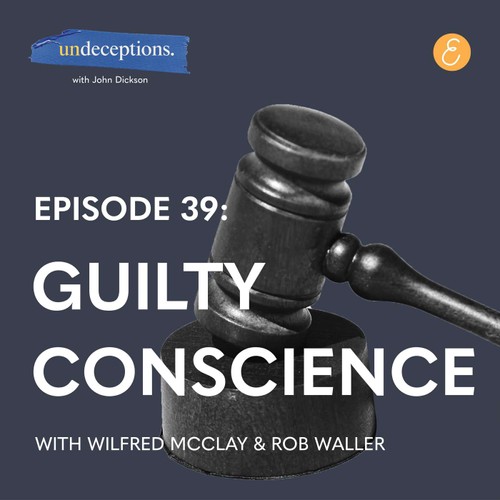
 Undeceptions with John Dickson
Undeceptions with John Dickson 39. Guilty Conscience
Guilt is a big topic - there is so much to say. Like the feeling of guilt itself, it is layered.
We deal with guilt on an individual level and on a societal one.
“Guilt is a religious problem which interests theologians, a social problem which interests sociologists and a psychological problem which interests psychologists,” wrote psychotherapist and theologian, Paul Tournier, in his book Guilt and Grace.
People sometimes speak of ‘religious guilt’ or ‘Catholic guilt’ and it’s almost always used negatively. The assumption is that if you are religious, you are dealing with much more guilt than the regular person, and certainly more than is healthy!
But maybe guilt is actually good?
And maybe religion - Christianity in particular - is the maestro of listening to, directing, and silencing the guilt we experience in our lives.
LINKS
- About that record... the first was already dead: angler -- read more about Clive White's trout confession.
- This episode is brought to you by Zondervan's new book Bullies and Saints: An honest look at the good and evil of Christian history by John Dickson.
- Meet our guest, Dr Rob Waller.
- Meet our guest, Professor Wilfred McClay
- Here's Rob's book, The Guilt Book
- Here's Bill's essay from The Hedgehog Review, The Strange Persistence of Guilt (behind a paywall, sorry!)
- The scene from Daredevil on Netflix was from Season 2, Episode 4. Though, we're not really saying you should watch it.
- This one's specifically for John, actually: More on 30 Rock, the American satirical comedy created by Tina Fey. (PS. It won 16 Emmy awards and is regarded as one of the best sitcoms of all time).
- Here's the atheist bus campaign that Bill talks about.
- You can learn more about Neitzsche's theory on the genealogy of guilt here.
- Here's Sigmund Freud's Civilisation and its Discontents, where he declared guilt to be “the most important problem in the development of civilization.” He said “the price we pay for our advance in civilization is a loss of happiness through the heightening of the sense of guilt.”
- Here we are again, with a link for the Netflix series The Good Place. (So great that we keep quoting it. Dear John, you should definitely keep watching. Love Kaley and Mark)
- There's a lot of views about whether or not to destroy Confederate statues. Here's a few interesting reads from different perspectives:
- A Solution to the Confederate-Monument Problem: Destroying the statues won’t erase the past. Why not let them deteriorate in a public space instead? from The Atlantic
- We need to move, not destroy, Confederate monuments from The New York Times
- Nearly 100 Confederate monuments removed in 2020, says report. Over 700 remain. from NPR (America's National Public Radio)
- The battle over Confederate statues, explained: Confederate statues have always been about white supremacy. That’s why they’re coming down, by Vox
- And, here's Undeceptions own Laurel Moffatt giving her thoughts during an Undeceptions single last year.
- Read the research by sociologists Bradley and Manning on victimhood: The Rise of Victimhood Culture, in which they write:
"A culture of victimhood is one characterized by concern with status and sensitivity to slight combined with a heavy reliance on third parties. People are intolerant of insults, even if unintentional, and react by bringing them to the attention of authorities or to the public at large. People increasingly demand help from others, and advertise their oppression as evidence that they deserve respect and assistance. This only increases the incentive to publicize grievances, and it means aggrieved parties are especially likely to highlight their identity as victims, emphasizing their own suffering and innocence."
- It's Jiminy Cricket!
- Read more on Professor Tyler Vander Weele's research on whether forgiveness is a public health issue.
